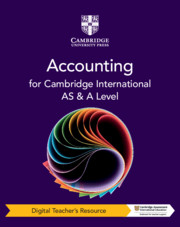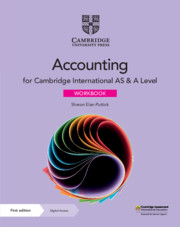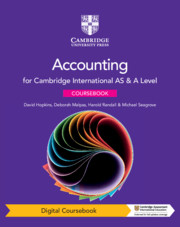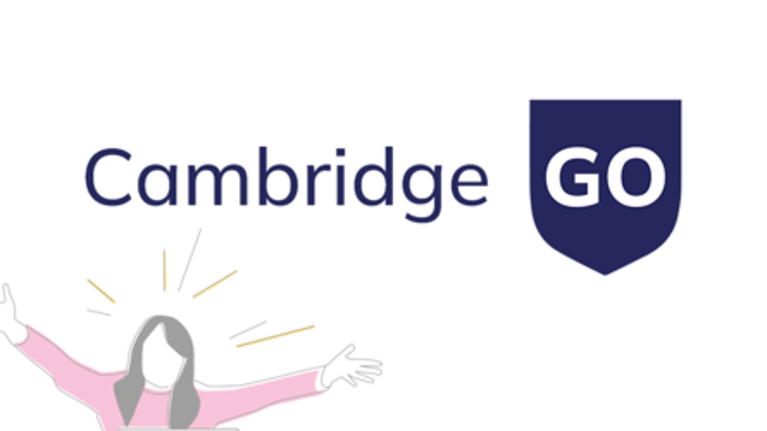Cambridge International AS & A Level Accounting Digital Teacher's Resource
Overview
Bring new ideas and inspiration into your Cambridge International AS & A Level Accounting classroom with our digital teacher’s resource. Our first edition for AS & A Level Accounting, this resource is filled with step-by-step lesson plans, differentiation and language advice, as well as downloadable materials, such as PowerPoint presentations and worksheets to save you valuable lesson planning time.
Features
- A learning objectives box at the start of every lesson contains learning intentions and success criteria to ensure your lessons remain focussed
- Step-by-step lesson ideas, including group activities, individual tasks and differentiation advice guide your teaching and bring new ideas into your lessons
- Language support for English as a second language learners in every chapter ensures that language level isn’t a blocker to learning
- Downloadable materials, such as PowerPoint presentations and topic worksheets, save lesson-planning time and can be used offline
- Common misconceptions help address student misunderstandings and support every learner
- Your digital teacher’s resource gives you access to everything you need - choose from editable Word files or PDFs to make lesson planning simple
- Access all your Cambridge resources anytime, anywhere and create your own collection in ‘My Resources’
Contents
- Introduction
- About the authors
- How to use this series
- How to use this Teacher's Resource
- Lesson plan template and exemplar
- About the syllabus
- About the examination
- Approaches to teaching and learning
- Teaching notes, supporting materials and answers
- Part I The accounting system
- Chapter 1: Double-entry bookkeeping: Cash transactions
- Chapter 2: Double-entry bookkeeping: Credit transactions
- Chapter 3: The books of prime entry
- Chapter 4: Balancing accounts
- Chapter 5: The classification of accounts and division of the ledger
- Chapter 6: The trial balance
- Part II Financial accounting
- Chapter 7: Statements of profit or loss for sole traders
- Chapter 8: Statements of financial position for sole traders
- Chapter 9: Accounting concepts
- Chapter 10: Accruals and prepayments (the matching concept)
- Chapter 11: Accounting for the depreciation of non-current assets
- Chapter 12: Irrecoverable debts
- Chapter 13: Bank reconciliation statements
- Chapter 14: Control accounts
- Chapter 15: The correction of errors
- Chapter 16: Introduction to incomplete records
- Chapter 17: Incomplete records - further considerations
- Chapter 18: Partnership accounts
- Chapter 19: Partnership changes
- Chapter 20: Manufacturing businesses
- Chapter 21: An introduction to limited company accounts
- Chapter 22: Limited companies – Further considerations
- Chapter 23: Non-profit making organisations (clubs and societies)
- Chapter 24: Statements of cash flows
- Chapter 25: Auditing and stewardship
- Chapter 26: International accounting standards
- Chapter 27: Computerised accounting systems
- Chapter 28: Business acquisition and merger
- Chapter 29: Ethical considerations
- Chapter 30: Accounting information for stakeholders
- Chapter 31: Analysis and communication of accounting information
- Part III: Cost and management accounting
- Chapter 32: Costing of materials and labour
- Chapter 33: Absorption costing
- Chapter 34: Unit, job and batch costing
- Chapter 35: Marginal costing
- Chapter 36: Activity-based costing
- Chapter 37: Budgeting and budgetary control
- Chapter 38: Standard costing
- Chapter 39: Investment appraisal.
Brighter Thinking Blog
Keep up to date with the latest classroom tips and educational trends from our brighter thinkers.
Visit the blogCatalogues and Ordering
Looking for something in particular or just browsing? View our catalogues to see our full range of print and digital books.
View and downloadAdvice on useful tools
Advice on useful tools, activities and timetabling from teachers experiencing school closures.
Cambridge GO
All our supporting resources have now moved to Cambridge GO – the new home for your Cambridge digital content.
Listen to our podcast
Listen to our podcast to discover teaching inspiration & advice from leading educational thinkers.







